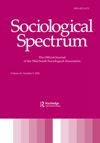Utilizing criminological theories to predict involvement in cyberviolence among the iGeneration
IF 1.1
3区 社会学
Q2 SOCIOLOGY
引用次数: 1
Abstract
Abstract Cyberviolence is a growing concern, leading researchers to explore why some users engage in harmful acts online. This study uses leading criminological theories—the general theory of crime/self-control theory, social control/bonding theory, social learning theory, and general strain theory—to explore why 15–18-year-old American adolescents join ongoing acts of cyberviolence. Additionally, we examine the role of socio-demographic traits and online routines in perpetuating cyberviolence. Results of an ordinal logistic regression indicate that low self-control, online strain, closeness to online communities, and watching others engage in online attacks are associated with joining an ongoing act of cyberviolence. Moreover, an individual’s age and familial relationships are inversely related to joining an online attack. Taken together, all four criminological theories we test help predict engagement in cyberviolence, indicating an integrative theory may be valuable in understanding participation in cyberhate attacks.利用犯罪学理论预测i世代参与网络暴力
摘要网络暴力是一个越来越令人担忧的问题,导致研究人员探索为什么一些用户在网上从事有害行为。这项研究使用了领先的犯罪学理论——犯罪/自我控制理论的一般理论、社会控制/联系理论、社会学习理论和一般压力理论——来探究15-18岁的美国青少年为什么会加入正在进行的网络暴力行为。此外,我们还研究了社会人口特征和网络惯例在网络暴力持续存在中的作用。有序逻辑回归的结果表明,低自控力、网络压力、与网络社区的亲密关系以及观看他人参与网络攻击与加入正在进行的网络暴力行为有关。此外,个人的年龄和家庭关系与加入网络攻击呈反比。总之,我们测试的所有四种犯罪学理论都有助于预测参与网络暴力,这表明综合理论可能有助于理解参与网络仇恨攻击。
本文章由计算机程序翻译,如有差异,请以英文原文为准。
求助全文
约1分钟内获得全文
求助全文
来源期刊

Sociological Spectrum
SOCIOLOGY-
CiteScore
3.80
自引率
5.60%
发文量
16
期刊介绍:
Sociological Spectrum publishes papers on theoretical, methodological, quantitative and qualitative research, and applied research in areas of sociology, social psychology, anthropology, and political science.
 求助内容:
求助内容: 应助结果提醒方式:
应助结果提醒方式:


